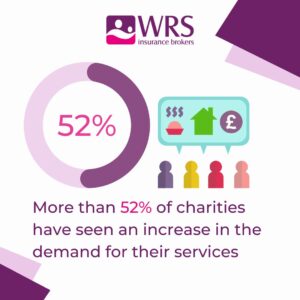
How are charities being impacted by the cost-of-living crisis?
In January 2023, as charity insurance specialists, we launched a survey to investigate the impact of the cost-of-living crisis on charities. The survey revealed that charities are experiencing substantial cost increases that are affecting their daily operations and fundraising activities. As a token of gratitude, every charity that participated in the survey was eligible for a chance to win £100 towards their operational expenses.
When analysing the results and researching further, we noticed that we were not the only ones within the charity industry trying to get a better understanding of this topic. So, to make life easier, we’ve collated the findings from other reputable sources, such as Charity Digital and The Charity Finance Group, to give you one complete view of the challenges charities are facing during the current financial climate.
Chris Chapman, Associate Director at WRS said: “We know that things are really tough for charities at the moment, rising operational costs coupled with a squeeze on donations are having a massive impact. Through this survey, we are looking to see if there is anything we, as a company, can do to highlight the problems facing charities or even ease this pressure in any way.”
Decrease in government funding
It’s important to note that funding for charities does not just come from public donations, the government also provides an income for charities, and according to the NCVO, that income fell by £645m in 2019/20. One respondent in our survey highlighted the real impact this has on smaller charities: “Where the larger charities used to get more government funding, now it is reduced they are going for the smaller pots of funding from trusts, lottery etc, which makes it harder for the smaller Charites to get, as they don’t do such a wide area.”
It is revealed by the NCVO that Government funding is at its lowest for 15 years and according to Charity Times, ministers have announced a reduction in support to pay energy bills, from £18bn starting from July 2022 to just £5.5bn from April 2023 to March next year.
Many charities still rely on funding from the government, local government and other public offerings as a key source of income. According to The Charity Finance Group, income from the government made up about a quarter of all charity income in 2018/19, however, this figure has persisted to decline since the early 2000s.
Not only does the charity sector have to deal with the cost-of-living crisis, but there are also continued outcomes from the mounting economic, operational and governance pressures from the pandemic, and the outbreak of conflict in Ukraine.
Not all hope is lost though, announced in the Spring 2023 budget, the Chancellor has introduced significant additional funding for frontline charities. Around 75% of the money will be delivered for the duration of 2023/24 as grants for organisations most impacted by increased demand. The funds will be spread over the following two years to increase the energy efficiency and sustainability of voluntary, community and social enterprise (VCSE) establishments across the UK.
This funding includes:
- VAT relief for energy-saving materials
- £100m to aid charities with service delivery and energy efficiency
- £10m to provide grant funding to suicide prevention to VCSE organisations
Increase in support with a decrease in funding & donations
It’s no surprise that the population in the UK is struggling with their finances, which in turn, affects charities as more people are in need of help – whether that be financially, mentally or emotionally – charities are finding themselves overwhelmed with enquiries. According to our survey, over 52% of charities surveyed have seen an increase in the demand for their services, and despite the previously mentioned support from the Spring Budget announcement, this increase in need looks set to continue.

One charity has stated “There has been a dramatic increase in the numbers of people needing our service. Due to the cost-of-living crisis more and more working people are struggling to cope and finding themselves unable to sustain their accommodation. Traditionally we supported street homeless people (including those with mental health issues, alcohol or substance misuse issues etc) but now most of the homeless people who need our support have found themselves without accommodation simply due to financial pressure.”
According to, the Masonic Charitable Foundation (MCF) food banks in particular seem to be struggling to maintain levels of support, one charity from our survey stated “there is a significant rise in the distribution of food bank parcels and families in need of support”. But, the Independent Food Aid Network state that at the start of 2022, 80% of food banks have experienced food supply issues, while 78% have witnessed a decline in both food and financial donations, making it incredibly difficult to keep up with demands. A sad example of where demand has increased, but donations have lessened due to fewer people being able to comfortably afford their own food bill.
When looking at pre-pandemic donation amounts, it’s unsurprising to see that fewer people are now donating. The MCF have also reported that an astounding 4.9m fewer people donated between January – April 2022 when compared to the same period in 2019.The impact of reduced donations is huge, as indicated by data from the Borough Wide Community Network in January 2023 which found that 60% of people have decreased their charitable contributions in the previous six months. Similarly, a survey by the polling company Savanta Comres of over 4,000 individuals shows that 60% of people have reduced their donations. These findings are also supported by data released by the debt charity StepChange.
Of course, help doesn’t always necessarily need to be financial, and it was pleasing to see that people are donating their time in place of money. 58% of charities that took our survey have seen an increase in volunteering, and one charity has stated “there is ongoing generosity of the general public and our volunteers”.
Staff and volunteers are stretched to the limit
Our survey also sought to find out how increases in operational costs such as staffing and utility expenses are affecting charities.
As we’ve indicated above, the increase in demand for services has a knock-on effect on charity employees and volunteers, resulting in them being stretched to their limit. Our data found that over 63% of charities surveyed said that their staff/volunteer workloads have increased, but due to the cost-of-living crisis, this is partnered with the charities having to make staff reductions and cuts in working hours to reduce costs. Some are even reluctantly having to reduce services on offer, meeting somewhere between demand and their own capacity.
An organisation from our findings has stated “The cost-of-living crisis is hot on the heels of the covid pandemic. This has compounded the effects on individuals’ mental health, as such, as a mental health charity, we have seen a dramatic increase in demands for services but do not have the funds to pay our staff what we would like to”
Operating costs are a worry
According to our survey, over 55% have not used their financial reserves but will likely use these in 2023, and over 76% have stated that operational costs are their biggest financial worry.

Our findings are backed up by the Charities Aid Foundation (CAF), who in November 2022 conducted a survey of 700 charities, which revealed that 51% of the organisations have already started using their reserves to cover their operational costs.
A quote from an article written by Charity Digital, CAF Chief Executive Neil Heslop says that “charities are running out of options, forcing them to rely on their reserves and cut back on the services they provide”.
Starting from April 1st, 2023, the National Living Wage will experience an increase of 92p, reaching a new hourly rate of £10.42. While this development will certainly benefit low-income workers aged 23 and over, however it will result in an increase in charity budgets to accommodate the changes.
Some of the charities in our results have expressed concerns, one stating that they “may not survive” or “make it through the summer”.
Not all hope is lost
The anticipation is that the Spring Budget announcement will provide some relief for charities and their financial challenges in the next two years, particularly for those frontline charities that have been hit the hardest during this crisis.
WRS are part of the Benefact Group, owned by Benefact Trust which has given to over 10,000 charities and counting and is the 3rd largest corporate donor in the UK. As a group, we’ve donated £100million to charity since 2016 and our target is to reach £250 million by 2025. Last year, Benefact Group employees directed over £500,000 to charity through their MyGiving programme and had 420,000 nominations from the public in our Movement for Good awards.
The charity sector is widely recognized as an increasingly vital component of society, especially in the delivery of services that have traditionally been provided by the public sector. These services include areas such as safeguarding, cancer research, homelessness, and addressing loneliness.
“Charities are the eyes, ears and conscience of society. They mobilise, they provide, they inspire, they advocate and they unite.” Quoted from ‘Stronger charities for a stronger society’ report.
About WRS Insurance Brokers
WRS Insurance Brokers are specialists in charity insurance. Our experienced charity insurance team are passionate about the sector. Our own directors have many years’ experience as trustees, so we understand that the risks charities face can be incredibly varied and ever-evolving. For more information call the team on 01206 760780.
WRS is part of the Benefact Group, a charity-owned, international family of financial services companies that gives all available profits to charity and good causes.